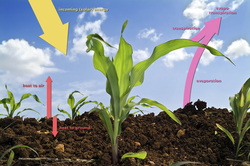|
As our climate warms, scientists expect evapotranspiration to follow suit. On a global scale, though, this apparently is not the case.
In an article published in Nature on Sunday, scientists said evapotranspiration—the movement of water from the land to the atmosphere—increased during the 80s and 90s, as warmer temperatures increased ocean evaporation and precipitation. But beginning in 1998, evapotranspiration actually slowed or stopped in much of the southern half of the globe. Soils in these areas have become drier and consequently release less water. The affected areas include both historically dry regions and tropical rainforests. "We didn't expect to see this shift in evapotranspiration over such a large area of the Southern Hemisphere," said Beverly Law, a professor of global change forest science at Oregon State University and co-author of the study. Scientists do not have enough historical data to determine if the change is due to natural variability or a long-term global trend, but the latter implies serious consequences. Less evapotranspiration means less global cooling, as well as more frequent and intense heat waves. This will also increase drought stress, lowering the productivity and carbon absorption of plants. Source: http://www.eurekalert.org/pub_releases/2010-10/osu-lt100110.php
0 Comments
Leave a Reply. |
with intentions.
|

 RSS Feed
RSS Feed
